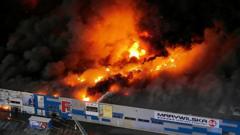Following a year-long investigation, Poland has accused Russia of orchestrating an arson attack that destroyed a shopping center, highlighting ongoing "hybrid warfare" tactics.
Poland Blames Russia for 2024 Shopping Center Blaze

Poland Blames Russia for 2024 Shopping Center Blaze
Prime Minister Donald Tusk announces that Russian intelligence services are behind the devastating fire at Warsaw's Marywilska shopping center.
Poland has leveled serious accusations against Russian intelligence services, claiming they orchestrated a devastating fire that engulfed the Marywilska shopping center in Warsaw last year. Prime Minister Donald Tusk took to X, asserting that Polish authorities "know for sure" the destructive blaze was a result of arson directed by Russian special operations. Tusk revealed that some individuals linked to the incident are already in custody, while others involved have been identified and are currently being pursued.
Moscow has not provided a response to the allegations, maintaining its previous denial of any involvement in sabotage activities within European nations. The May 2024 fire resulted in the decimation of more than 1,400 small businesses, a large number of which were operated by members of Warsaw's Vietnamese community. In an extensive year-long investigation, Polish authorities have concluded that the fire was sanctioned by a yet-to-be-identified individual based in Russia. A joint statement from Poland's justice and interior ministers confirmed that the actions of those apprehended were "organised and directed by a specific person residing in the Russian Federation," noting cooperation with Lithuania as some of the suspects are believed to have engaged in diversionary acts there.
Since Russia's invasion of Ukraine in early 2022, Poland has detained several individuals accused of collaborating with Russian intelligence in sabotage efforts, indicating a broader strategy of "hybrid warfare" directed by Moscow. This form of warfare typically involves anonymous and plausible deniability attacks against infrastructure, designed to inflict harm without escalating to outright hostilities. NATO allies have expressed similar concerns regarding Russia's clandestine activities across Europe in efforts to intimidate or deter military support for Ukraine.
Earlier this year, Lithuanian prosecutors pointed fingers at Russia's military intelligence service, accusing it of masterminding an arson attack on a Vilnius IKEA location. Tusk corroborated this by stating that Lithuanian findings were consistent with Poland's suspicions about Russian secret services being behind the shopping center infernos in both cities.
In the aftermath of the Marywilska fire, many workers lost vital documents and significant sums of money that were stored in the shopping center to mitigate the risk of home break-ins. To address the economic fallout, a temporary shopping center was established three months post-fire, allowing around 400 vendors to continue their operations. Additionally, a new alternative shopping center, Modlinska 6D, opened in October 2024, accommodating many displaced businesses affected by the tragedy.




















